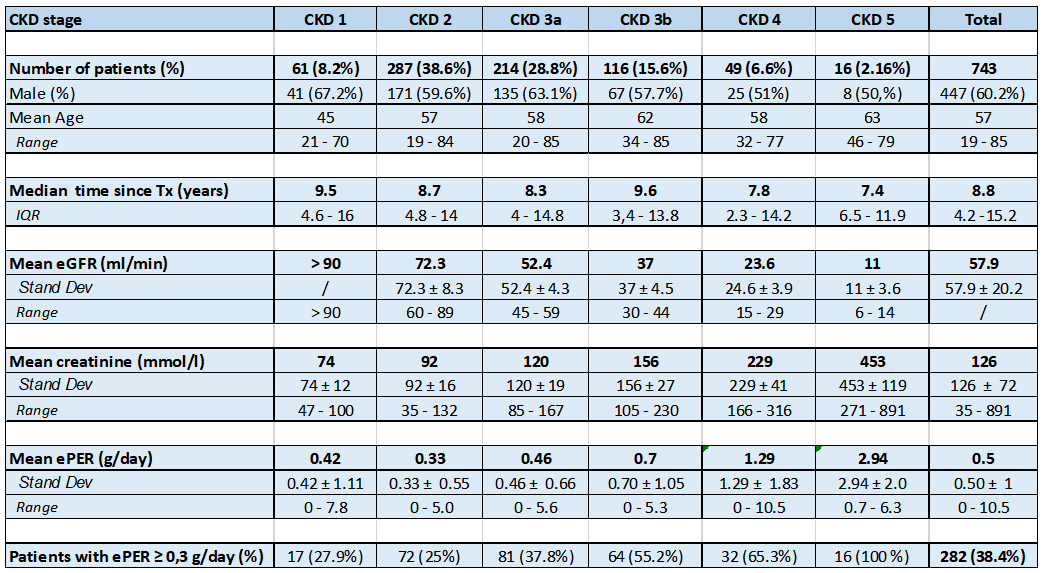Advanced chronic kidney disease in kidney transplant recipients: A national cross-sectional cohort study
Bojan Medved1,2, Jadranka Buturović Ponikvar1,2, Miha Arnol1,2, Jakob Gubenšek1,2.
1Department of Nephrology, Centre for Kidney Transplantation, University Medical Centre Ljubljana, Ljubljana, Slovenia; 2Faculty of Medicine, University of Ljubljana, Ljubljana, Slovenia
Introduction: The prevalence and stages of chronic kidney disease (CKD) are rarely reported in kidney transplant recipients. The aim of our retrospective cross-sectional study was to investigate the presence and stages of CKD in a national cohort of adult patients with functioning kidney grafts in Slovenia, with a special focus on patients with advanced CKD (stages 4 and 5).
Methods: Patients' data were collected from the Slovenian Renal Replacement Therapy Registry. Adult patients with functioning kidney grafts at the end of 2021 were analyzed. Patients without data on kidney function at the end of 2021 were excluded (6 patients). In a group of patients with advanced CKD, the presence of a functional AV fistula and data on comorbidities were collected in addition to the standard data.
Results: At the end of 2021, there were a total of 743 adult patients with a functioning kidney graft (including 52 patients transplanted in the same year). The majority of patients were male. Almost half of all patients (46.8%) had CKD stage 1 or 2 with near-normal kidney graft function (eGFR ≥ 60 ml/min). Kidney transplant recipients with advanced CKD (stages 4 and 5) represented a minority of patients (8.8%). The estimated protein excretion rate (ePER) increased gradually with CKD stage. The median time since transplantation was almost 9 years in all groups (Table 1).

104 (14%) patients had a functioning kidney graft for 20 years or more since transplantation, including 17 patients with a functioning graft for more than 30 years. 3 patients had a functioning kidney graft 37 years after transplantation, all of whom had preserved kidney function (CKD stage 2).
There were 65 patients with advanced CKD; for the majority (89%) this was the first kidney graft. Functional arterio-venous (AV) fistula was present in almost half of them and in approximately two-thirds of patients with stage 5 CKD. Among comorbidities, hypertension was present in 45 (69%), diabetes in 16 (25%), dyslipidemia in 36 (55%) and renal anemia in 32 (49%) (Table 2).

Conclusions: Almost half of the adult patients with functioning kidney graft in the Slovenian national cohort had CKD stage 1 or 2 with near-normal kidney graft function, while patients with advanced CKD (stages 4 and 5) represented only 8.8 % of the cohort. Increased levels of proteinuria were observed with increasing CKD stage. Half of the transplanted patients with advanced CKD (stages 4 and 5) had a functional arteriovenous fistula for hemodialysis and almost two-thirds of the patients with stage 5 CKD.
